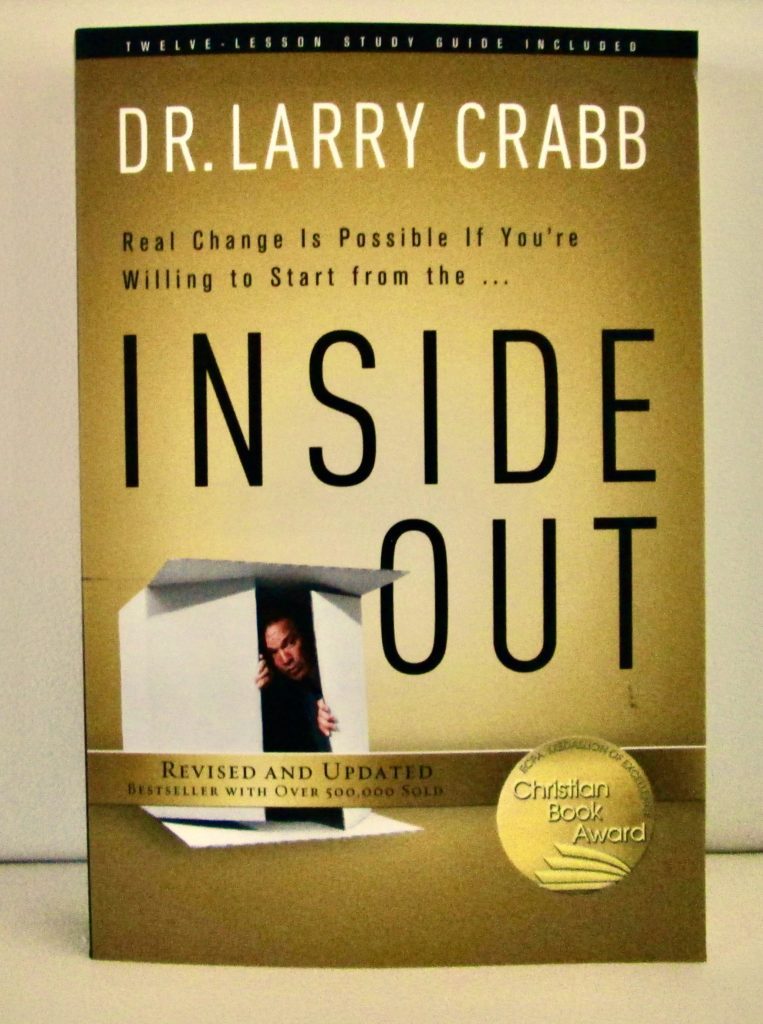
At the end of part one of the book review for Inside Out, I left you with the idea that to cope with life better, we have to change ourselves from the inside out. The book asks the question:
“What Does It Mean to Change?” (p. 42)
The next questions are: “What is a maturing Christian like on the inside? What will he feel? Will he have a consistent desire to do what’s right or will he fight a raging battle within between urges to do wrong and commitments to do right?” (p.43)
When we begin to look deeply within ourselves we start to think we are really messed up. “Just a quick glance beneath the surface of our life makes it clear that more is going on than loving God and loving others.” (p.46)
So we begin to “rearrange rather than change and, in so doing, never become the transformed people God calls us to be. We never experience freedom from destructive patterns of living.”(p.48)
The Lord “directs us to enter the dark regions of our soul to find light, to experience His presence…. We’re capable of believing we’re doing far better than we are. Our Lord reserved His harshest criticism for people who made denial into a trademark. The Pharisees specialized in looking good.” (pp. 48-49)
Dr. Larry Crabb breaks us down into two groups:
- Shallow Copers – people who cope with life by dealing with whatever they can handle and ignoring all the rest.
- Troubled Reflecters – folks who wrestle honestly with at least some of the disturbing parts of their lives for which they have no real answers. (p.52)
Which group do you fall into?
“God is most fully known in the midst of confusing reality. To avoid asking the tough questions and facing the hard issues is to miss a transforming encounter with Him. (p.53)
“When we see and own the core troubles in our heart, God’s Spirit leads us deeper, where we discover a concern for another’s well-being that is greater than our concern for our own. We can know that the Spirit is guiding our inside look when we want to love someone else.” (p.54)
“Our love for others is genuine and deep to the degree that we know what it means to quietly rest in God’s love for us. Resting in His love, however, does not always mean feeling His love. Feeling loved can be produced in a moment and lost in the next. Resting in love happens as we humbly trust God to love us at our worst.” (p.57)
Change requires moral effort, and good patterns of behavior, but these alone, no matter how intensely we try, cannot produce the deeper character qualities we need. We need complete dependence on God.(see p.59)
“Learning to love is not only necessary for spiritual maturity but also central to overcoming psychological problems.” (p. 60)
Dr. Crabb gives a list of options that we all try at one time or another.
- Do your Christian duties.
- Depend on the special work of the Holy Spirit.
- Work through obstacles to growth. (see pp. 61-67)
These alone do not lead us where we need to go to effect true change.
Churches teach, “‘If people would get into the Word, on their knees, and out into their neighborhoods witnessing for Christ, they would have no time for personal aches and pains. Forget all this psychological business of looking inside and get serious about your commitment to Christ.'” (p. 70)
In Jeremiah 2:13 the Bible shows us the problem.
- We are thirsty.
- We are trying to fix the problem on our own and are moving in the wrong direction to satisfy that thirst. (see p. 72)
GOD IS CLEAR IN SCRIPTURE ABOUT WHAT HE DOESN’T LIKE US TO DO
- “Our Lord severely rebuked people whose lives merely conformed to scrupulously high standards of religious conduct (see Matthew 23:13-36).”
- “Christ exposed the dirt hidden beneath an outwardly religious, moral, disciplined life.”
- “And the ordinary people—folks who were more relaxed than committed—made the Lord gag. ‘I know your deeds, that you are neither cold nor hot. I wish you were either one or the other! So, because you are lukewarm—neither hot nor cold—I am about to spit you out of my mouth’ (Revelation 3:15-16).” (See page 80)
So what is the answer?
Dr. Crabb says that more effort is not the answer. (see p. 81)
We have to learn to deal with our desires. He says it is okay to desire and it is okay to hurt. (see pp. 84-85) We hurt because we long for what we can’t have and “because sin is a bigger problem than we think.” (p.91) “We have all felt profoundly disappointed in every key relationship we’ve ever had. Therefore, we hurt.” (p.92)
“We are dependent by nature. We require resources outside ourselves if we’re to enjoy either physical or personal life. We literally and absolutely need someone stronger than we are to look after us and provide for us what we were designed to enjoy. God intended that we warmly respond to the loving strength of another….Adam and Eve were to turn to God as the strong one on whom they could depend and then to each other….” (pp. 88-89)
Confused? It is hard to weed through a look inside—to separate what God wants, from our own desires. Come back next week as we take a deeper look at how to face the deep thirst within us all.
“If anyone is thirsty, let him come to Me and drink!” (John 7:37 AMP)
-Question to reflect on this week: What is one thing that you would like to change about yourself to look more like Christ?

Thanks for sharing the detail and your thoughts.